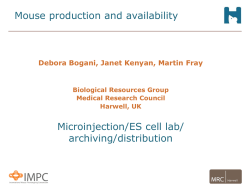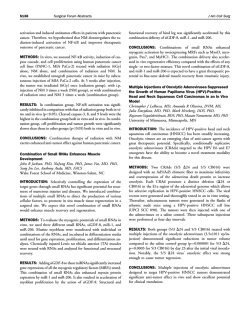
GASTROINTESTINAL CANCER CLINICAL RESEARCH UNIT
Vice-Direction of Translational Research GASTROINTESTINAL CANCER CLINICAL RESEARCH UNIT Clinical Research Programme | Gastrointestinal Cancer Clinical Research Unit Manuel Hidalgo Clinical Research Unit Head Staff Scientist Pedro P. López Post-Doctoral Fellows Lucía Fernández, Lucas Moreno Graduate Students Spas Dimitrov, Raquel Martínez ( until August ), Beatriz Salvador ( since September ) Technicians Natalia Baños, Alejandro Márquez ( July-October ), Marina MendiburuEliçabe ( since November ), Camino Menéndez, Manuel Muñoz Clinical Investigator Victor Moreno OVERVIEW The Gastrointestinal ( GI ) Cancer Clinical Research Unit focuses on the clinical development and personalised application of novel therapeutics for patients with cancers of the pancreas and colon. Our work combines the preclinical assessment of novel anticancer agents in ‘ Avatar ’ mouse models with the design, conduction, and analysis of clinical trials using these agents. Over the last few years we have implemented a growing portfolio of clinical trials with new agents spanning a broad range of mechanisms of action. An important development in this area has been the recent report that nab-paclitaxel – an agent that we helped to develop – improves survival in patients with pancreatic cancer ; the results from this trial have led to the approval of the drug to treat this disease. “ In 2014, nab-paclitaxel, a drug that we helped to develop, was approved to treat patients with pancreatic ductal adenocarcinoma ( PDA ). We have also shown promising results with demcizumab ; a new drug that targets cancer stem cells in KRAS mutant tumours, and whose development is advancing rapidly in clinical trials conducted by our Group.” Key to our work is the development and characterisation of Avatar mouse models for drug screening, biomarker development, and personalised medicine. We have developed and have characterised the largest collection of these models for pancreatic cancer. We use the Avatar models in 3 critical applications, including 1 ) the screening of new anticancer agents ; 2 ) conduction of co-clinical trials, in which ongoing clinical trials are performed in parallel with studies using Avatar models of the same cancer type in order to elucidate mechanisms of action and biomarkers of drug response/resistance ; and 3 ) finally, we are using the Avatar models for personalised cancer treatment integrated with next generation sequencing. SCIENTIFIC REPORT 2014 118 SPANISH NATIONAL CANCER RESEARCH CENTRE, CNIO 119 Vice-Direction of Translational Research Clinical Research Programme | Gastrointestinal Cancer Clinical Research Unit RESEARCH HIGHLIGHTS In 2014, we continued the lines of work summarised below that were initiated in the previous year : response to this drug. Our initial efforts focused on the expression of the SPARC protein but, unexpectedly, these studies did not reveal a predictive role for SPARC. Interestingly, these clinical results were predicted by mouse model studies ( FIGURE 1 ). Based on these data, we are now exploring other markers such as Cav1 and FAP. Avatar mouse model development and characterisation Our Group has continued its efforts to develop and characterise Avatar models from patients with GI malignancies, as well as other tumour types, for drug screening, development of drug combinations, biomarker discovery, and personalised medicine. This collection of patient-derived xenografts ( PDX ) from PDA is the largest and best characterised collection available so far, and represents an important resource for academic and industry investigators within the framework of the European PDX Consortia. We have also co-authored several papers, listed below, based on collaborative work performed using our collection for drug development and biological studies. Examples of some of the most recent agents that we have tested include the PanHer inhibitor SYM013 – which has been shown to have activity in KRAS mutant p53 WT tumours – and Palbociclib, an inhibitor of CDK4/6 that targets p16 defective cancers. Importantly, we are conducting a clinical trial in which Avatar models will be generated from metastatic tumours derived from 100 patients treated with nab-paclitaxel and gemcitabine ; these models will serve as an important platform to investigate and validate new biomarkers. Likewise, our clinical efforts in PDA are now geared towards improving the outcome of patients treated with this new combination. As mentioned above, preclinical work has suggested that drugs targeting the Notch pathway such as demcizumab, an antagonist of DLL4, have shown dramatic activity. In a phase I-II study, we have shown promising clinical activity with this agent in patients with PDA ( FIGURE 2 ). Based on this data, our group is now leading the clinical development of this agent in an international phase II trial. Development of novel anticancer agents Our goal in this area is to implement an integrated approach that combines next generation sequencing with Avatar mouse model development. In a pilot study, we performed whole-exome sequencing analysis in 25 patients with advanced solid tumours in order to identify putatively actionable tumour-specific genomic alterations. Avatar models were used as an in vivo platform to test proposed treatment strategies. A total of 13 patients received a personalised treatment, of which 6 achieved durable remissions. Based on these results we launched the Avatar clinical trial, in which patients with advanced PDA are randomised to either a standard of care approach or to a personalised approach ; for the latter we perform a tumour biopsy followed by exome analysis and the generation of an Avatar model to experimentally test treatment options resulting from the genetic analysis. So far, we have enrolled 20 patients in this trial. s ∞∞ ∞∞ PUBLICATIONS Miranda-Lorenzo I, Dorado J, Lonardo E, Alcala S, Serrano AG, Clausell-Tormos J, Cioffi M, Megias D, Zagorac S, Balic A, Hidalgo M, Erkan M, Kleeff J, Scarpa A, Sainz B Jr, Heeschen C ( 2014 ). Intracellular autofluorescence : a biomarker for epithelial cancer stem cells. Nat Methods 11, 1161-1169. Martinez-Garcia R, Lopez-Casas PP, Rico D, Valencia A, Hidalgo M ( 2014 ). Colorectal cancer classification based on gene expression is not associated with FOLFIRI response. Nat Med 20, 1230-1231. SCIENTIFIC REPORT 2014 ∞∞ ∞∞ Hidalgo M, Amant F, Biankin AV, Budinská E, Byrne AT, Caldas C, Clarke RB, de Jong S, Jonkers J, Mælandsmo GM, Roman-Roman S, Seoane J, Trusolino L, Villanueva A ( 2014 ). Patient-Derived Xenograft Models : An Emerging Platform for Translational Cancer Research. Cancer Discov 4, 998-1013. Garralda E, Paz K, López-Casas PP, Jones S, Katz A, Kann LM, López- Rios F, Sarno F, Al-Sahrour F, Vasquez D, Bruckheimer E, Angiuoli SV, Calles A, Díaz LA, Velculesc VE, Valencia A, Sidransky D, Hidalgo M ( 2014 ). Integrated next generation sequencing and avatar mouse models for personalized cancer Figure 2 Waterfall plot of : Gemcitabine and Nab-paclitaxel plus Demcizumab in patients with PDA. Preliminary efficacy data of the triple combination in patients with advanced PDA showing promising response rates. Personalised treatment of pancreatic cancer We have significantly expanded our portfolio of early clinical trials in patients with GI cancer and other malignancies. At present, the GI Cancer Unit is conducting more than 20 clinical studies with novel anticancer agents, spanning a wide range of mechanisms of action, such as signalling inhibitors ( FGFR, RAF, MEK, HER ), Notch inhibitors, conventional chemotherapy and angiogenesis inhibitors. More recently, we have been involved in studies with immune targeting agents and oncolytic adenoviruses. These studies include first-in-class/first-in-human clinical trials and analysis of clinically important biomarkers, as well as co-clinical studies in mouse models. Our most relevant contribution to this field has been the work that led to the approval of nab-paclitaxel for PDA. Over the past year, we have intensively investigated biomarkers that predict ∞∞ Figure 1 Effects of SPARC deletion in the PDA KRAS-driven mouse model. The impact of SPARC knock-down in a KRAS-p53 mouse model of PDA is shown. PDA developed in these models independently of SPARC levels. Likewise, the intratumour distribution of nab-paclitaxel is not affected by the levels of SPARC. Nab-PTX efficacy was similar in models with varying degree of SPARC expression. ∞∞ ∞∞ treatment. Clin Cancer Res 20, 2476-2484. Yu KH, Ricigliano M, Hidalgo M, Abou-Alfa GK, Lowery MA, Saltz LB, Crotty JF, Gary K, Cooper B, Lapidus R, Sadowska M, O’Reilly EM ( 2014 ). Pharmacogenomic Modeling of Circulating Tumor and Invasive Cells for Prediction of Chemotherapy Response and Resistance in Pancreatic Cancer. Clin Cancer Res 20, 5281-5289. Balic A, Dræby Sørensen M, Trabulo SM, Sainz B Jr, Cioffi M, Vieira CR, Miranda-Lorenzo I, Hidalgo M, Kleeff J, Erkan M, Heeschen C ( 2014 ). Chloroquine targets pancreatic cancer stem cells via inhibition of CXCR4 ∞∞ ∞∞ and hedgehog signaling. Mol Cancer Ther 13, 17858-1771. Estévez LG, Suarez-Gauthier A, García E, Miró C, Calvo I, Fernández-Abad M, Herrero M, Marcos M, Márquez C, Lopez Ríos F, Perea S, Hidalgo M ( 2014 ). Molecular effects of lapatinib in patients with HER2 positive ductal carcinoma in situ. Breast Cancer Res 16, R76. Alvarez R, Musteanu M, Garcia-Garcia E, Lopez-Casas PP, Megias D, Guerra C, Muñoz M, Quijano Y, Cubillo A, Rodriguez-Pascual J, Plaza C, de Vicente E, Prados S, Tabernero S, Barbacid M, Lopez-Rios F, Hidalgo M ( 2014 ). Reply : ‘ Comments on Stromal disrupting ef- 120 ∞∞ ∞∞ ∞∞ fects of nab-paclitaxel in pancreatic cancer ’. Br J Cancer 111, 1677-1678. Viúdez A, Ramírez N, Hernández-García I, Carvalho FL, Vera R, Hidalgo M ( 2014 ). Nab-paclitaxel : A flattering facelift. Crit Rev Oncol Hematol 92, 166-180. Barone G, Tweddle DA, Shohet JM, Chesler L, Moreno L, Pearson AD, Van Maerken T ( 2014 ). MDM2-p53 interaction in paediatric solid tumours : preclinical rationale, biomarkers and resistance. Curr Drug Targets 15, 114-123. Salazar R1, Calles A, Gil M, Durán I, García M, Hidalgo M, Coronado C, Alfaro V, Sigue- ∞∞ ∞∞ ro M, Fernández-Teruel C, Prados R, Calvo E ( 2014 ). Phase I study of carboplatin in combination with PM00104 ( Zalypsis®) in patients with advanced solid tumors. Invest New Drug 32, 644-652. Martinez-Garcia R, Juan D, Rausell A, Muñoz M, Baños N, Menéndez C, Lopez-Casas PP, Rico D, Valencia A, Hidalgo M ( 2014 ). Transcriptional dissection of pancreatic tumors engrafted in mice. Genome Med 6, 27. Dragovich T1, Laheru D, Dayyani F, Bolejack V, Smith L, Seng J, Burris H, Rosen P, Hidalgo M, Ritch P, Baker AF, Raghunand N, Crowley J, Von Hoff DD ( 2014 ). Phase II trial of vatalanib SPANISH NATIONAL CANCER RESEARCH CENTRE, CNIO ∞∞ ∞∞ in patients with advanced or metastatic pancreatic adenocarcinoma after first-line gemcitabine therapy ( PCRT O4-001 ). Cancer Chemother Pharmacol 74, 379-387. Cubillo A, Hernando-Requejo O, GarcíaGarcía E, Rodriguez-Pascual J, De Vicente E, Morelli P, Rubio C, López-Ríos F, Muro A, López U, Prados S, Quijano Y, Hidalgo M ( 2014 ). A Prospective pilot study of target-guided personalized chemotherapy with intensity-modulated radiotherapy in patients with early rectal cancer. Am J Clin Oncol 37, 117-121. Cubillo A, Rodriguez-Pascual J, López-Ríos F, Plaza C, García E, Alvarez R, de Vicente E, Quijano Y, Hernando O, Rubio C, Perea S, Sanchez G, Hidalgo M. Phase II Trial of target-guided personalized chemotherapy in first-line metastatic colorectal cancer. Am J Clin Oncol. PMID :24517959. ∞∞ ∞∞ ∞∞ AWARDS AND RECOGNITION The 2013 “ el Talento ” Prize in the Academic Talent Category endowed by the Spanish business daily Cinco Días. Science Committee Member, Cancer Research UK. 121
© Copyright 2026






